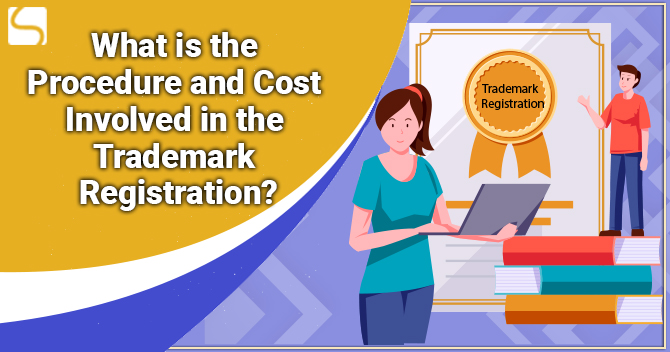What is the Procedure and Cost Involved in the Trademark Registration?

Japsanjam Kaur Wadhera | Updated: Feb 03, 2021 | Category: Trademark
A trademark is a mark such as symbol, word, name, design, logo etc which is used by a company or an individual to distinguish its products and services from the others. It is used to provide a distinctive characteristic to the products so that it can easily be identified by the people as well as can be trusted by them for the quality provided by such brand. It helps the brand to create its own reputation in the market. It is necessary for an individual or a company to obtain Trademark registration to protect its brand from being infringed by others. Therefore, this article will give you the information regarding what is the procedure and cost involved in the trademark registration.
Table of Contents
Who can apply for Trademark Registration?
Any individual, company, legal entity or proprietor claiming to be the owner of the trademark can apply for trademark registration. Obtaining trademark registration helps the owner of the mark to protect it from being infringed by others or used illegally without his permission. Once the trademark is registered, the owner gets the right to take legal action against any person who infringes his registered trademark and sue him in the court of law. Trademark Registration helps to identify the products or services and its sources. It further helps in the advertisement of the products or services and guarantees its quality.
Types of Trademark
The various types of trademarks registered in India are as follows:
- Name, a coined word or inverted word or any arbitrary dictionary word, which is not descriptive of the character or quality of the goods or services.
- Letters, alphanumeric or numerals or any combination thereof.
- Symbol, letters, image, design, logo, monograms, shapes etc.
- Sound marks in audio format.
Also, Read: What are the Advantages of Trademark Registration?
Procedure for Trademark Registration in India
The below mentioned steps are required to be followed for Trademark Registration in India:
- Step 1: The applicant is required to search for a trademark which is not similar to the already registered marks. A trademark of the company or an individual must be unique which can easily attract the people and can be easily advertised. The applicant must do an in- depth research to be more accurate in finding a trademark which does not resemble to those already registered.
- Step 2: The applicant is required to file an application of trademark registration with the Registrar of Trademark. The application should be filed at the head office or the branch office of the registrar of trademark. The application is then digitalized and checked formally.
- Step 3: Once the trademark application is filed, the registrar of trademark office shall appoint a trademark examination officer who shall examine the application. If the examination officer is satisfied with the trademark application he shall approve for the registration of the trademark. However, if the examination officer is not satisfied with the application, he shall pass a refusal order for the same.
- Step 4: Once the examination officer approves the application, he shall proceed further with publishing it in the Trademarks Journal for scrutiny. If no objection is raised by any person within a period of 3 months, then the application is proceeded to be accepted.
- Step 5: When the trademark application is accepted, a trademark registration certificate is provided to the registered trademark holder.
- Following these steps helps the business to obtain trademark registration and to protect its brand from any infringement of laws.
Forms that are required to be submitted by the applicant in different cases are as below:
- Form TM-1: Applications for registration of trademark for specification of goods or services which is included in class one.
- Form TM-2: Applications for registration of trademark for goods or services included in a class from a convention country.
- Form TM-51: Applications for registration of trademark for goods or services falling under different classes
- Form TM-52: Applications for registration of trademark for goods and services from a convention country, falling under different classes.
What are the Documents required for filing Trademark Registration Application in India?
The following documents are required for filing trademark registration application:
- Copy of logo or trademark.
- Identity proof- Aadhar card, driving license, PAN Card.
- Goods or services to be registered.
- Details of the applicant such as name, address and nationality.
- Incorporation certificate of the company.
- Date of first use of the trademark in India if used by the person or a company prior to applying.
- Power of Attorney applied by the applicant.
Cost of Trademark Registration in India
The cost of trademark registration is Rs. 4,500/- per application per class where an applicant is an individual or Startup or small enterprise and Rs. 9,000/- per application per class in all other cases.
Conclusion
The intellectual property rights in Trademark arise for a brand who wishes to distinguish its products from the other and provide a distinctive identity to it. The registration of the trademark under the trademarks act is a proof of the prima- facie ownership of the mark. The registration can be obtained for logo, words, slogan, device, numerals etc in India. The procedure and cost involved in the trademark registration is discussed above in the article by which a company or an individual can obtain a registered mark and protect its brand from any infringement in the market.
The person owing a trademark has a right to take legal actions against any person using his mark illegally without his consent. Trademarks that are identical or similar to an already existing registered mark cannot be registered. Therefore, in order to apply for trademark registration, one should choose a mark which has a distinctive character. Further, a trademark, once it is registered becomes an asset or intellectual property for a business which can be sold, licensed or assigned by the owner of the mark in return of royalty. It safeguards the interest of the company and the individual and benefits the brand to a large extend.
Also, Read: Know how Indian Trademark Registration Will Boost Your Business














